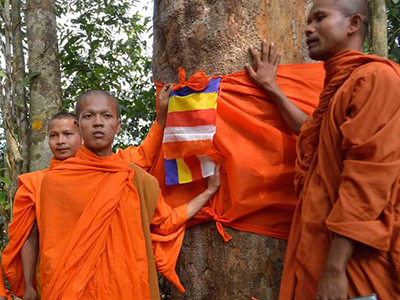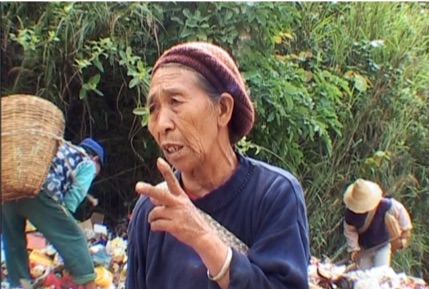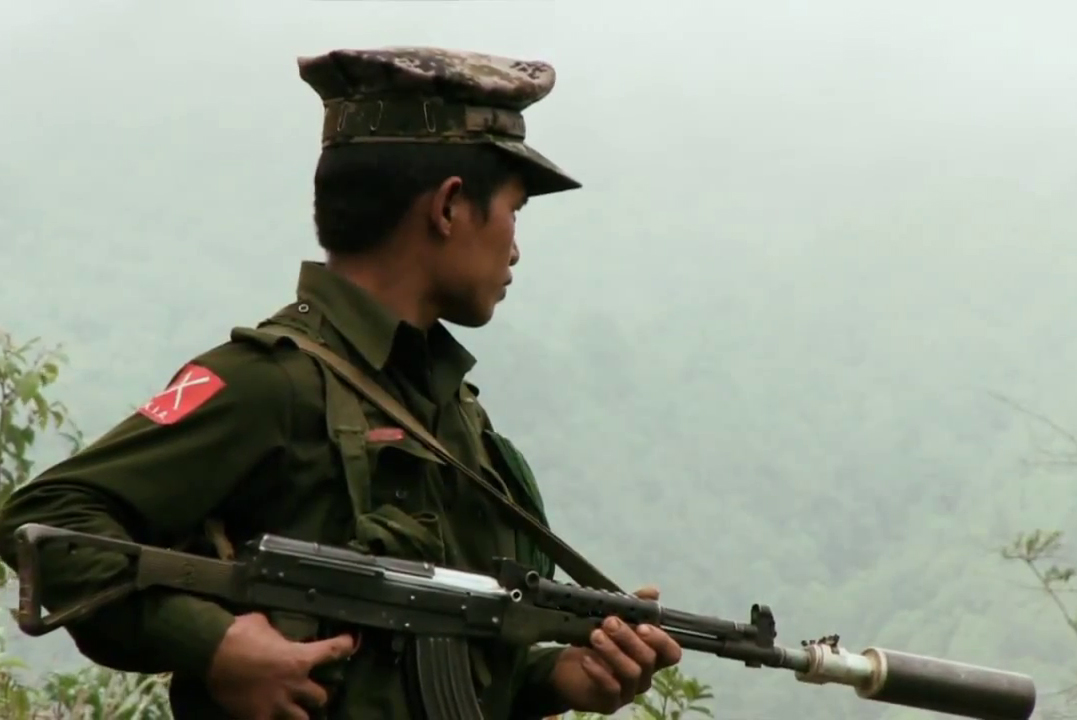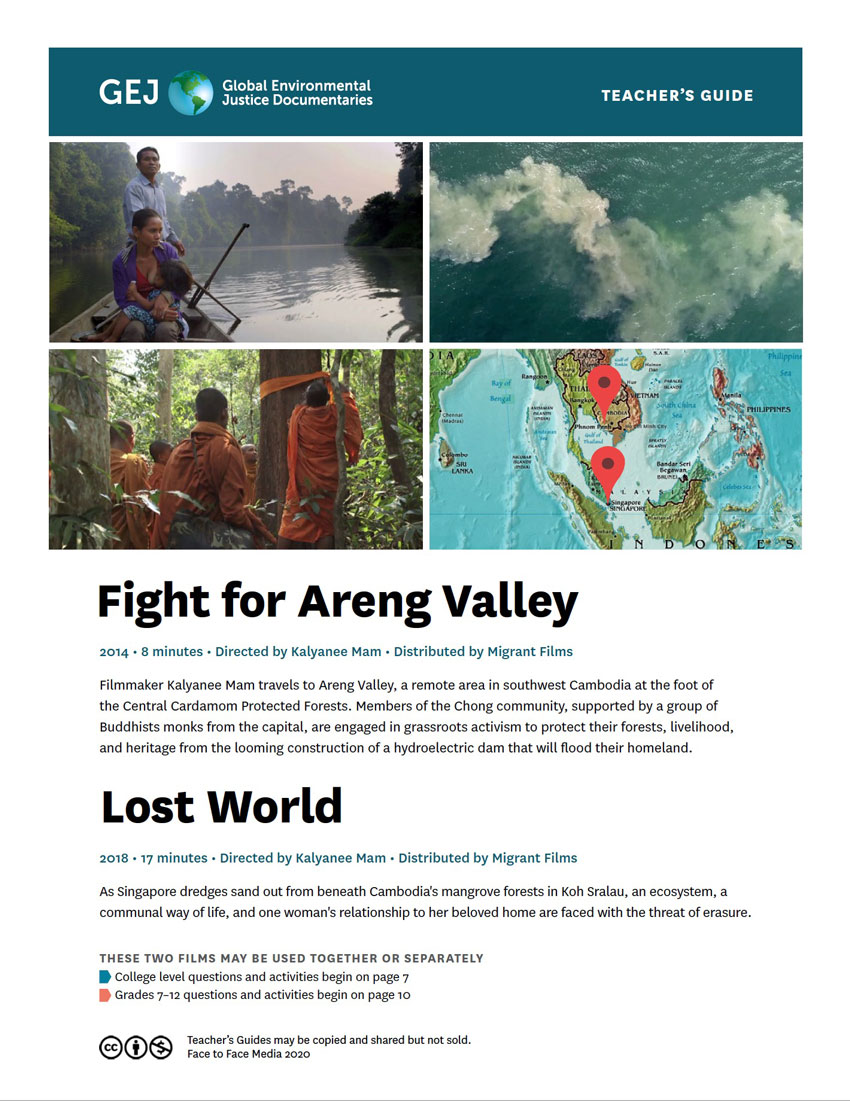Curator
 — Rajashree Ghosh, Resident scholar, Women's Studies Research Center and lecturer, Environmental Studies program, Brandeis University
— Rajashree Ghosh, Resident scholar, Women's Studies Research Center and lecturer, Environmental Studies program, Brandeis University
Fight for Areng Valley + Lost World
In the Areng valley in southwest Cambodia members of the Chong community, supported by Buddhist monks, oppose the construction of a dam that would flood their forest homeland. In Lost World sand mining on Cambodia's west coast undermines the mangrove forests ecosystem that supports a local fishery and a communal way of life.

Co-curators
Rajashree Ghosh
Resident Scholar, Women’s
Studies Research Center,
Brandeis University
Miriam Morgenstern
Social Justice Educator,
Curriculum Consultant
Two related films
These films directed by Cambodian-American filmmaker Kalyanee Mam can be used separately or together.
Teacher's guides for college and secondary use
Please see the teacher's guide for maps, background, questions and activities for each film, and supplementary materials.
For grades 8-12
The guide also includes lesson plans for grades 8-12 for each film. This is an experiment. If you would like to see more lesson plans for secondary use, in this vein, please contact us at info@facetofacemedia.ca
Synopses
Fight for Areng Watch this film
Reem Sav See and her family, members of the Chong ethnic minority, depend on the unspoiled river and forest environment in the lush Areng Valley for their livelihoods. The Areng Valley is home to 1,700 people, mostly Chong, who live in close-knit communities that are deeply connected to the land by local conservation and belief systems. The Chong consider the surrounding forests and the pristine Areng River to be sacred, inhabited by spirits, and the source of life. However, with support from China, the Stung Tatay dam is being constructed on the river, threatening to flood large swathes of forest and farms and displace 1,500 people. Given the threats to the sacred forests, rivers, and to their lives and livelihoods, Reem Sav See and other community members join Buddhist monks from Phnom Penh to oppose the dam and protect the forests.
Lost World Watch this film
Near Koh Sralau, off the west coast of Cambodia, sand dredging is ravaging the ecosystem of the mangrove forests that thousands of families depend on for their livelihoods. Eighty million tons of sand have been extracted and transported to Singapore to expand its landmass and build a theme park. Dredging machines and sand barges also dump their waste directly into the river, causing steep declines in fish and crab catches. Vy Phalla and members of her village have borne the brunt of the mining operations. While residents of Koh Sralau grapple with the threat of erasure, a ravaged natural landscape, and ruined livelihoods, Singapore thrives in its veneer of sustainability in artificial “cloud forests” constructed in a greenhouse that showcases an exotic “lost world.”
Why we selected these films
Fight for Areng Valley and Lost World shed light on the environmental destruction caused by sand mining and dam construction in Cambodia, along with the more general threat posed by “development” projects to the culture, heritage, and livelihoods of indigenous peoples globally. The challenges facing the communities in these films are extraordinary, but so too are the people. They are strengthened by a proud heritage and a belief in a better future for their children and homeland.Taken together, these stories, beautifully filmed by Cambodian-American director Kalyanee Mam, provide a vivid and thoughtful meditation on humankind’s relationship to the natural world.
The enviironmental Justice focus of these films
Since the sand dredging began, every family in Vy Phalla’s community at Koh Sralau has experienced a family member being forced to migrate to other places and even other countries for work. “First the land gives way,” the director writes, “and then the people, and soon the entire fabric of a culture and identity is lost. Land was once considered the most secure and sacred ground we could stand on. Now even land, like people and commodities, can move and shift, smuggled and bartered for profit.”
file names
Download the teacher's guide for Fight for Areng Valley and Lost World (pdf)
No transcript available.
Lost World review
Full of haunting imagery, and anchored by an intense, yet charismatic, performance of simmering rage from its main subject, Lost World is technically an “issue doc”, but I hesitate to use that phrase due to the negative connotations that surround it. No less powerful or thoughtfully constructed than the best scripted dramas, Kalyanee Mam’s film encompasses vast juxtapositions in a slow-motion lament against environmental degradation, loss, and rapacious capitalism. It is, to my mind, a masterclass of the doc-form, and my favorite short of this young year so far.
The film opens with aerial photography—distant overhead drone shots capture an alien process. Giant excavators dredge huge quantities of sand from the under the water then deposit it in barges. Something as simple as this expository montage hides layers of meaning that set the stage however. The overhead angle induces a feeling of estrangement for the viewer, the patterns producing an affect akin to a Burtynsky work. This is abnormal. Simultaneously, the distance of the shots connects to the setting, establishing a sense of place as we more fully take in the landscape, but also connect to the enormity of the project—invoking the massive scale of the theft.
We return to the drone footage throughout the short, it serves a delineator between thematic chapters. Accompanying us as well throughout is Phalla Vy, a young Cambodian woman whom serves as guide for what is happening to her home of Koh Sralau, a tiny island where fishing and crabbing is a way of life—activities that are threatened by Singapore’s confiscation of Cambodian earth. The first chapter introduces the issue—the barges, the large facilities that hold the accumulated sand. Phalla Vy stands in their midst, wonder and horror showcasing on her face in equal measure. The second chapter delves into life on Koh Sralau. In a simple, observational way, we see the people and the way of life that is threatened. Poetic images like a girl snatching a snail off of a leaf, or the ritual of old women shelling crab in a circle, contribute to a portrait of a community, and we receive testament that the changing ecological conditions are disrupting the aquatic life that the village relies on.
Phalla Vy is an engaging subject. Young and pretty, she is restrained in manner, but the fire of indignation emanates outwards. While not explored in-depth, you get the feeling that you’re watching a fierce activist’s origin story. Mam is attuned to her, and alongside her editor, S/W alum Adam Loften, knows when to hold a shot that extra second to accentuate Vy’s alternately dark or despairing moods. Still, after 2 chapters, the film verges on repetition and threatens to lose steam. Then the third chapter arrives however, and is so wonderfully conceived; darkly humorous, but thematically poignant, that it not only rescues the film from its threatened lull, but elevates the whole. I was so surprised and affected by it that I don’t wish to say any more, and instead encourage you to simply see it for yourself.
The film comes to us via Go Project, the production company of frequent S/W-featured filmmaker Emmanuel Vaughn-Lee, who serves as producer. It premiered on Emergence Magazine a few months ago, but escaped our notice until Vaughn-Lee reached out to us recently, and we’re glad he did. I was not familiar with Mam’s work before her breakthrough feature A River Changes Course won Sundance in 2013, and to my shame did not followup and watch the film afterwards. What Lost World teaches me however is that the acclaim she has received (including a coveted MacArthur grant) is no fluke—Mam “gets” documentary filmmaking on a deep level. She has the dedication and empathy to embed deeply in communities over long periods of time to gain familiarity and trust, and possesses the ability to communicate sophisticated ideas visually, both with what she shows and what she withholds. Furthermore she knows how to construct feeling, both in eliciting it from her subjects, but also producing it via her final arrangement. I’m wildly impressed, and eager to see more. Fortunately more is on the way—Mam is currently in Cambodia working on a followup to A River Changes, titled Fire and the Birds Nest.
https://www.shortoftheweek.com/2019/01/23/lost-world/
Awards
Fight for Areng Valley
San Francisco International Film Festival (2019)
Golden Gate Award [Nominee]
Best Documentary Short
Citation
Main credits
Mam, Kalyanee E. (film director)
Mam, Kalyanee E. (film producer)
Mam, Kalyanee E. (director of photography)
Pelletier, Ken (film producer)
Hoffman, Allison (film producer)
Vaughn-Lee, Emmanuel (film producer)
Loften, Adam (film producer)
Other credits
Fight for Areng Valley: edited by Chris Brown; director of photography, Kalyanee Mam; composer, Tyler Strickland. Lost world: edited by Adam Loften; cinematography by Kalyanee Mam; original music by David Mendez, Matthew Atticus Berger.
Distributor credits
Pelletier,Ken; Hoffman,Allison; Lost World: Emmanuel Vaughn-Lee, Adam Loften, Kalyanee Mam;
Mam, Kalyanee
FIGHT FOR ARENG VALLEY
DIRECTOR: Kalyanee Mam
PRODUCERS: Ken Pelletier, Allison Hoffman
EDITOR: Chris Brown
DOP: Kalyanee Mam
CINEMATOGRAPHER: Christopher Rompre
COMPOSER: Tyler Strickland
SOUND RECORDISTS: Ken Pelletier
LOST WORLD
DIRECTED BY Kalyanee Mam
FEATURING Vy Phalla, Vy Seyrah, Ming Pheap, Penn Sophany,K a Min, Luy One
PRODUCED BY Emmanuel Vaughn-Lee, Adam Loften, Kalyanee Mam
EDITED BY Adam Loften
CINEMATOGRAPHY BY Kalyanee Mam
ASSOCIATE PRODUCER Mot Kimry
AERIAL CINEMATOGRAPHY Charles Lim Yi Yong, Mot Kimry, Ken Pelletier, Trippin’ Creatives
ORIGINAL SONG BY Vy Phalla ORIGINAL MUSIC BY David Mendez, Matthew Atticus Berger PIANO PERFORMED BY Adam Shulman
SOUND RECORDING BY Mot Kimry, Rorn Makara, Kalyanee Mam
SOUND EDITOR D. Chris Smith
COLORIST Chris Madera
ASSISTANT EDITOR Ben Suliteanu
TRANSLATIONS BY Fatily Sa, Kalyanee Mam
PHOTOGRAPHY BY Mona Simon, Ken Pelletier, Kalyanee Mam
WITH SUPPORT AND FUNDING FROM John D. and Catherine T. MacArthur Foundation ADDITIONAL FUNDING Heinrich Böll Stiftung
SPECIAL THANKS Penn Sophany, Mot Sopha, Mot Kimry, Alex Gonzalez Davidson, Ken Pelletier, Mona Simon, Fran Lambrick, San Mala, Hun Vannak, Doem Kundy Ali Al-Nasani, Lai Chiet, Keah Bora, Sau Senn, Math Not, Mey Nop, Mot Dal Kareem, Hamid Sobhiyah, Math Aysah, Senn Ru, SaSom Tah, El YTam, Pou Gnget, Khieu Saron Rith Vina, Mot Saleh, Ong Aysah, Math Chik, Chik Zahri, Him Sleh Pusiyah
Docuseek subjects
Forestry
Environmental Justice
Food
Government Policy
Environment
Environmental Justice
Environmentalists
Habitat Destruction
Geography
Community
Indigenous Studies
Environmental Law
Estuaries
Conservation and Protection
Ethics
Organic and Sustainable Agriculture
Asian Studies
Globalization
Energy Sector
Development
Biodiversity
Forests and Rainforests
Rivers and Lakes
Hydroelectric
Resource Planning and Management
Migration
Colonialism
Religion and Spirituality
Buddhism
Indigenous Spirituality and Religion
Nature
Conservation Biology
Ecology
Marine Biology
Dams and Hydroelectricity
Human Rights
Rural Sociology
Distributor subjects
Keywords
Welcome to Docuseek2!
Docuseek2 is a streaming platform of the best documentary and social issue films available for the higher education community.
Anyone may search for titles and find detailed information about the titles. To preview films or license them for streaming, you must register and login.
Currently, we support online registration for anyone affiliated with a higher education institution. Please inquire if you are with a K-12 district or school or with a public library.
Click the Close button to get started!



